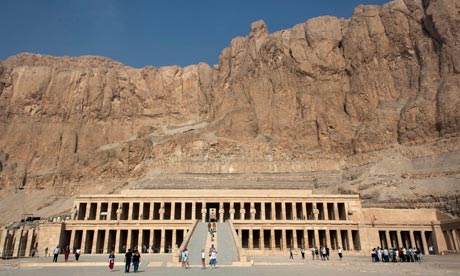Egypt's Mohamed Morsi appoints hardline Islamist to govern Luxor
Concerns for tourism as governor is member of Gamaa Islamiya, the militant group responsible for 1997 Luxor massacre

Luxor's ancient temples and statues bring in foreign tourists, who are vital to the local economy. Photograph: Nasser Nasser/AP
The Egyptian president, Mohamed Morsi, has appointed a member of the hardline Islamist group Gamaa Islamiya to the governorship of Luxor – a tourist city in which militants associated with the group killed 58 tourists in 1997.
The symbolism of the appointment has enraged Egypt's sidelined non-Islamist opposition, who see it as further evidence that Morsi is unconcerned about the country's increasing polarisation.
Tourism is the lifeblood of Luxor, home to some of Egypt's most dramatic ancient temples and pharaonic tombs, including that of
Tutankhamun. The city has been hit hard by the downtown in foreign visitors during the past two years of turmoil.Members of the tourism industry are worried about the impact of the new governor both because of his ties to the former militant Gamaa Islamiya and because of the prospect of a hardline Islamist running the city and surrounding province.
"Is it unimaginable that those who plotted, participated or played any role in the massacre of Luxor, become the rulers even if they renounced and repented it," said Tharwat Agamy, the head of Luxor's tourism chamber. He said that he along with others in the tourism industry, politicians and activists, they were considering chaining the doors of the governor's building and sending him back to the airport.
Morsi's allies see it as his right as an elected president to appoint supporters to key positions. But liberals and secularists feel that it is his job to unify the country with more neutral appointments.
"You need the most qualified people for government jobs," said Hussein Abdel Ghany, a senior spokesman for the National Salvation Front (NSF), a large but disparate coalition of liberal and leftist parties. Instead, Abdel Ghany argued, Morsi had "put his people in bureaucratic positions and this will badly affect the services provided to the Egyptian people".
Adel el-Khayat, Luxor's new governor, is not a member of the Muslim Brotherhood, the group Morsi once helped lead. But he is a leading Salafist (or ultraorthodox) politician, and from a conservative section of society that has broadly supported Morsi's rule, but whose support may now be wavering. His appointment – one of 17 changes to Egypt's 27 governorships – is therefore seen as an attempt to shore up support for Morsi within Salafist spheres, ahead of massive planned protests against Morsi's rule on 30 June.
Opposition members – buoyed by a petition calling for Morsi's removal that organisers claim has been signed by more than 7 million Egyptians – hope a similar number will turn out at the protests. Morsi's party is so worried that it has established a crisis committee to deal with the fallout from a day billed as a second revolution, while Egypt's army has promised to deploy to protect state institutions.
In Luxor itself, Morsi's move was met with anger. "How is this guy from this group [Gamaa Islamiya] going to encourage tourism?" asked Alaa Mahmoud, the owner of Magic Horizon, a tourism company in the city. "No one in Luxor wants him. It's like Morsi wants to finish the country."
The NSF's Abdel Ghany said: "It sends a very bad message to the tourist industry and the families of those killed … Morsi is destroying the image of Egypt as a tourist destination and a civil society in favour of satisfying the Salafist groups."